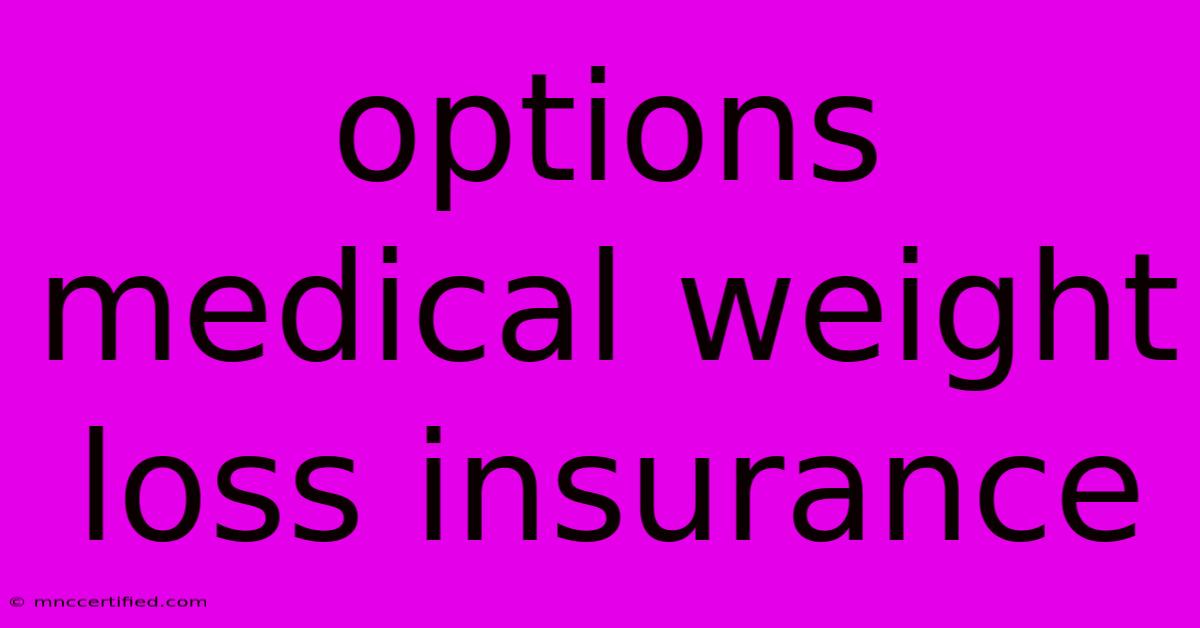Options Medical Weight Loss Insurance

Table of Contents
Navigating the World of Medical Weight Loss Insurance: What You Need to Know
Losing weight can be a challenging journey, and having the right support can make all the difference. For many individuals, medical weight loss programs offer a structured and supervised approach to achieving their weight loss goals. But with the rising cost of healthcare, understanding your insurance coverage for these programs is crucial.
This guide will provide you with a comprehensive overview of medical weight loss insurance, including:
- What is Medical Weight Loss Insurance?
- Understanding Coverage and Requirements
- Factors Affecting Coverage
- Tips for Finding Covered Programs
- Alternatives to Insurance Coverage
What is Medical Weight Loss Insurance?
Medical weight loss insurance refers to the coverage offered by your health insurance plan for weight loss programs that are deemed medically necessary. These programs are typically overseen by healthcare professionals, such as physicians, registered dietitians, or psychologists, and may involve:
- Medical evaluations: Assessments to determine underlying medical conditions contributing to weight gain.
- Personalized weight loss plans: Tailored strategies including diet modifications, exercise recommendations, and behavioral therapy.
- Medication assistance: Prescribing weight loss medications when deemed appropriate.
- Ongoing monitoring and support: Regular follow-up appointments and guidance from healthcare providers.
Understanding Coverage and Requirements
The extent of your medical weight loss insurance coverage depends on your specific plan and the provider network. Here are some key factors to consider:
Covered Services:
- What services are included? Check if your plan covers initial evaluations, nutritional counseling, medication, and follow-up appointments.
- Are there any limitations on visits or services? Many plans have limits on the number of visits or specific services you can access.
- Are there specific program requirements? Some plans may require you to meet certain criteria like a body mass index (BMI) threshold or a failed attempt at losing weight through other methods.
Cost Sharing:
- What is the copay or coinsurance for each service? Understand the out-of-pocket costs associated with visits, medications, and other program components.
- Is there a deductible for weight loss services? Some plans require you to meet a deductible before coverage kicks in.
- Are there out-of-network costs for certain providers? Check if your plan covers out-of-network providers and any potential cost differences.
Factors Affecting Coverage
Various factors influence your chances of getting medical weight loss insurance coverage.
- Plan Type: Health Maintenance Organization (HMO) plans are typically more restrictive, while Preferred Provider Organization (PPO) plans offer greater flexibility and provider choice.
- Pre-existing Conditions: If you have underlying medical conditions like diabetes, high blood pressure, or sleep apnea, your coverage may be more comprehensive.
- Location: Coverage can vary depending on the state or region you reside in.
- Insurance Provider: Different insurance companies have varying policies and coverage levels for medical weight loss programs.
Tips for Finding Covered Programs
- Contact Your Insurance Provider: Reach out to your insurance company directly to inquire about your coverage for medical weight loss programs.
- Use Online Tools: Many insurance websites offer resources and search functions to help you find in-network providers and program options.
- Ask Healthcare Providers: Your primary care physician or a specialist can guide you toward programs covered by your insurance.
- Seek Referral Programs: Some insurance companies have designated referral programs for medical weight loss, connecting you with approved providers and programs.
Alternatives to Insurance Coverage
If your insurance doesn't cover medical weight loss programs, several alternatives are available:
- Out-of-Pocket Programs: Consider exploring individual weight loss programs and negotiating payment plans.
- Employer Wellness Programs: Some employers offer discounted or subsidized weight loss programs as part of their employee benefits package.
- Community-Based Resources: Investigate local community centers, health organizations, and fitness facilities for affordable weight loss support.
Conclusion
Navigating the world of medical weight loss insurance can be complex, but understanding your coverage and options is essential for making informed decisions. By researching your plan, seeking guidance from healthcare professionals, and exploring alternative pathways, you can find the right support to embark on your weight loss journey with confidence.

Thank you for visiting our website wich cover about Options Medical Weight Loss Insurance. We hope the information provided has been useful to you. Feel free to contact us if you have any questions or need further assistance. See you next time and dont miss to bookmark.
Featured Posts
-
Salah Contract News Big Boost For Liverpool
Nov 10, 2024
-
Arcane Season 2 Review A Must Watch For Fantasy Fans
Nov 10, 2024
-
King Leads Silent Nation On Remembrance Sunday
Nov 10, 2024
-
Cause Of Prospect Park Brush Fire Under Investigation
Nov 10, 2024
-
Pickford Shuts Out West Ham In 0 0 Draw
Nov 10, 2024